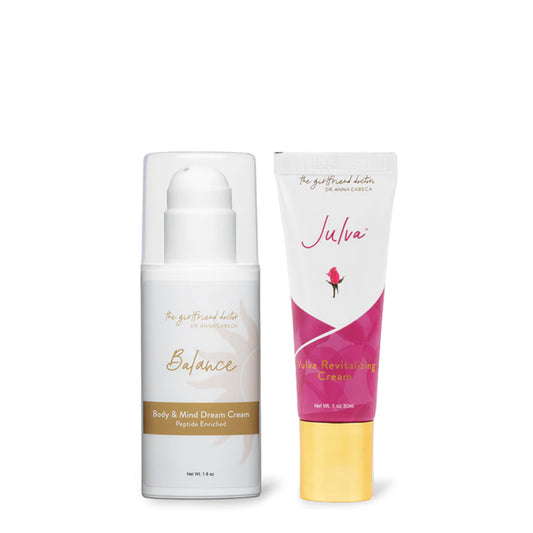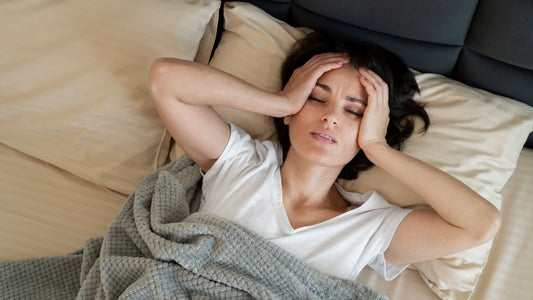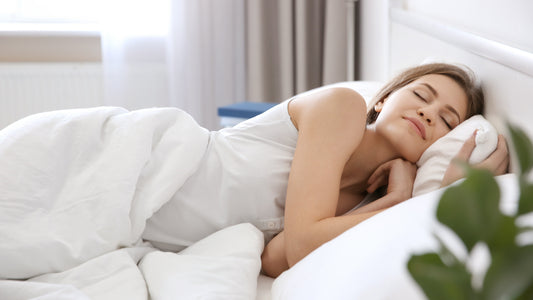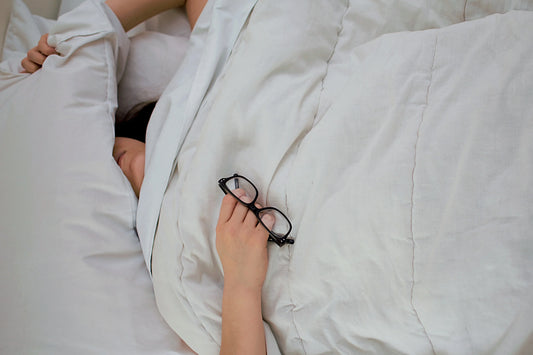Have you ever awoken at 3 AM and been unable to fall back to sleep? Or been exhausted all day long but when the clock strikes bedtime, you lie there, tossing and turning? What about difficulting reaching that deep, restful sleep state you used to enjoy? Then buckle in, because I’m going to lay out my best menopause sleep problems natural remedies for you.
Menopause can be such a challenging time, and adding poor sleep to the mix just doesn’t make it any easier, does it?
But, you also don’t want to start popping sleeping pills every other night, either.
As someone who’s suffered from varying levels of insomnia throughout my life, I know how it feels to want to sleep — but you just can’t. While your hormones during menopause have a lot to do with these sleep struggles, there are ways to support the hormone situation and fix those menopause sleep problems.

Where It All Starts: Perimenopause And Sleep Issues
For a lot of women, perimenopause is when sleep starts to feel complicated. After years of not having to think about getting to sleep, it now feels elusive. Sleep issues are often one of the first frustrating signs that progesterone is starting to dip.
Problem is, that it may not happen every night, so you assume it could be something else. Maybe it’s stress. Maybe I ate dinner a bit too late. Maybe it’s anxiety. And sometimes, even if you test your hormones, they show up as “normal” on a test, so you just don’t put the pieces together (and neither does your doctor).
But then, as time progresses and your sleep problems become more pronounced, the connection between perimenopause and sleep may become a bit more clear.
So, what do these menopause sleep issues feel like?
Here’s what I often hear from my patients:
I lay awake until 3 AM and then wake up at my usual time of 6:30 AM feeling like a zombie
I wake up in the middle of the night and I can’t get back to sleep at all
My sleep is extremely light, I feel like I’m awake all night, and yet I remember dreaming
I’m exhausted and feel ready for sleep, but when I lie down, my mind starts racing
I wake up multiple times a night and it takes me a while to fall back to sleep
The Menopause And Sleep Problems Connection
We know menopause and sleep issues often go hand in hand. Why?
Well, a few things are working to create the perfect storm that fosters sleep disturbances in menopause. Here are the 4 biggest challenges:
Sex Hormones

1. Sex Hormones
Your hormones play a huge role in your sleep, especially progesterone. Progesterone calms and relaxes your body and mind. So, when progesterone levels decline, it means menopause sleep disturbances increase.
Be sure to read this article on how to increase progesterone levels naturally.
Adrenal Health

2. Adrenal Health
There’s so much pressure on your adrenals during perimenopause and menopause. And while they’re trying their best, it may not quite be good enough to get you to sleep on time. For one thing, your adrenals can be a kind of backup source of progesterone production (see #1 above). So when they aren’t feeling the strongest, menopause and sleep problems tend to increase.
And then, there’s the fact that when your adrenals are run down, they get confused at bedtime. They tend to send signals that perk you up at night, instead of in the morning. This makes sleep problems so much more difficult.
If you’re feeling sluggish in the morning and wired but tired at night, it’s probably because your adrenals are not feeling their best.
Hot Flashes And Night Sweats

3. Hot Flashes And Night Sweats
Menopause and sleep problems often go hand in hand because your body’s temperature regulation is going haywire at night.
When you’re having a hot flash at night, it’s called a night sweat. This is that feeling when you wake up drenched, feeling like someone just poured a pot of boiling water on you.
Obviously, it’s going to be difficult to get good quality sleep when you keep getting woken up by these uncomfortable hot spells.
Hot flashes and night sweats can be the result of a combination of things that start to change in your body during menopause, including lowered progesterone, adrenal health, and blood sugar levels.
Blood Sugar Dysregulation

4. Blood Sugar Dysregulation
Yes, blood sugar can play a role in your menopause insomnia problems. For one thing, when your blood sugar levels are high, your kidneys try to help by making you urinate often. This can be problematic when they do this as you’re trying to sleep. Constantly having to get up to pee all night long is not a recipe for a great night’s sleep.
Blood sugar dysregulation is certainly a complicating factor when it comes to so many menopause symptoms. That’s why I included blood sugar-balancing cinnamon bark in my natural menopause sleep support formula, Night Zzz.
Menopause Sleep Problems Natural Remedies And Hacks

1. Keep A Bedtime Schedule
Remember how I said that blood sugar dysregulation can cause sleep problems in menopause? Well, what’s really frustrating is that the worse you sleep, and the later you go to sleep — the worse your blood sugar regulation becomes. (1) It’s a neverending loop of bad sleep, weight gain, blood sugar dysregulation, and more bad sleep.
In order to help break the cycle, one of the most important things you can do is stick to a bedtime routine and schedule. Ideally, you want to wake up and go to bed at the same time every day of the week, including on the weekends.

2. Try A Nightly Routine
A lot of women aren’t great at prioritizing self-care. We take care of so many other things, and we tend to put ourselves last on our own lists.
This becomes glaringly obvious in menopause.
But your nightly routine is a great place to start putting your self-care first. Once everything else is taken care of for the day, give yourself some time to just relax. Try incorporating a few things from this list and make them your own. Do them every night before bed, giving your body the signal that it’s time to sleep.
Just as an example:
Turn off all the lights in the house to stimulate melatonin production
Light a candle
Take your nighttime supplements
Have a nice cup of herbal tea
Wash your face and put on night cream
Put a few drops of lavender essential oil into your diffuser
Crawl into bed with a good book and read for 20 minutes
When you create a routine that you look forward to, it makes going to bed much more pleasurable.

3. Magnesium For Menopause Sleep Loss
Magnesium is essential for your body and your muscles to relax. (2) And a shocking number of women are deficient in this crucial mineral.
For best results, be sure to include lots of magnesium-filled foods in your diet. Think tons of leafy greens, nuts, and seeds.
This is the magnesium supplement I personally use and love.

4. Exercise, But Do It Earlier
Exercise is one of the most important things you can do for your body and your health, there’s no doubt about that.
But, if you’re struggling with sleep, it could be because you’re exercising too vigorously later in the day. Try doing your more strenuous workouts earlier and stick to a gentle post-dinner stroll in the evenings. Don’t skip your workouts altogether, though, studies suggest sufficient exercise can help you sleep a little longer, and reduce insomnia. (3)

5. Sleep Hygiene
Good sleep hygiene can also go a long way towards helping with menopause insomnia. In addition to the things I’ve already mentioned, like keeping a sleep routine and schedule, it’s important to also:
Keep your room dark, cool, and quiet at night
Avoid caffeinated beverages like coffee and tea later in the day
Stop eating a few hours before bed
Put your devices away

6. Cut Out Alcohol
I know it can be tempting, but alcohol before bed is actually not helping you sleep. In fact, studies show alcohol suppresses rapid eye movement (REM) sleep and causes you to wake up throughout the night and/or early in the morning. (4,5)

Tart cherries, also called Montmorency cherries, are a delicious and natural way to support sleep. Studies suggest that tart cherry juice can help increase sleep time and efficiency, and may even help reduce cholesterol and inflammation. (6,7,8) It’s a delicious way to help you drift off to sleep that doesn’t involve alcohol.
Tart Cherry is a superstar ingredient in my Night Zzz menopause sleep support formula.
Does Menopause Cause Sleep Problems?
Sleep issues do certainly get worse for many women in menopause. But you have a lot of power when it comes to naturally supporting your body and creating a self-care routine that works to help you get a full night’s rest.
While your blood sugar, adrenals, and hormones are working against you right now, with some extra love, you can get things back on track.
That’s why I designed my Night Zzz formula specifically to help you when you can’t sleep in menopause. It supports your adrenals with maca and vitamin C, melatonin production with tart cherry, estrogen processing with broccoli, and blood sugar and inflammation support with turmeric and cinnamon bark.
It’s a truly multi-pronged approach to getting shut-eye that leaves you feeling refreshed and ready to tackle the day.








